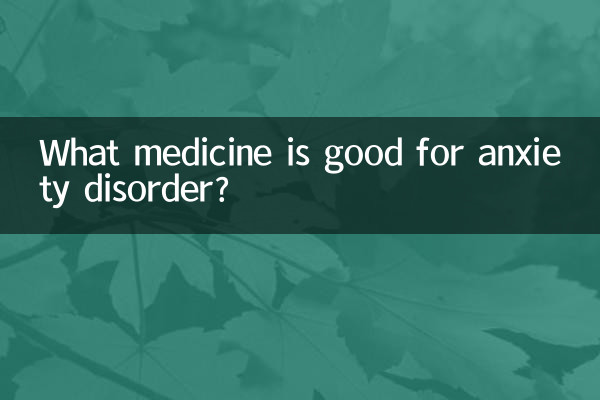What medicine is good for anxiety disorder?
In recent years, with the accelerated pace of life and increasing social pressure, anxiety disorders have become one of the common psychological problems among modern people. Many patients are concerned about which medicine for anxiety is effective and has few side effects. This article will combine the hot topics and hot content on the Internet in the past 10 days to provide you with structured data analysis to help you understand relevant information about anxiety medication.
1. Common symptoms of anxiety disorders

Anxiety disorders not only manifest themselves as psychological tension and worry, but may also be accompanied by the following physical symptoms:
| Symptom type | Specific performance |
|---|---|
| psychological symptoms | Excessive worry, fear, difficulty concentrating, irritability |
| Physiological symptoms | Palpitations, sweating, tremors, muscle tension, headache |
| behavioral symptoms | Avoiding social interactions, double-checking, and restlessness |
2. Commonly used drugs for treating anxiety disorders
Based on professional physician recommendations and clinical research, the following are mainstream medications for treating anxiety disorders:
| drug class | Representative medicine | Mechanism of action | Common side effects |
|---|---|---|---|
| SSRIs | Sertraline, fluoxetine | Increase brain 5-HT levels | Nausea, insomnia, sexual dysfunction |
| SNRIs | Venlafaxine, duloxetine | Simultaneous regulation of 5-HT and NE | Dry mouth, constipation, elevated blood pressure |
| Benzodiazepines | alprazolam, diazepam | Enhance GABA effect | Drowsiness, risk of dependence, memory loss |
| beta blockers | propranolol | block the effects of epinephrine | Low blood pressure, fatigue, dizziness |
3. Precautions in drug selection
1.individualized treatment: Different patients have very different reactions to drugs, and doctors need to adjust the medication plan according to the specific situation.
2.drug dependence risk: Although benzodiazepines have quick effects, long-term use may lead to dependence, so short-term use is recommended.
3.Onset of effect: SSRIs and SNRIs usually take 2-4 weeks to show effects, and patients need to be patient and cooperate with treatment.
4.combination therapy: Severe anxiety disorders may require psychotherapy, such as cognitive behavioral therapy (CBT).
4. Adjuvant treatment methods
In addition to medication, the following methods can also help relieve anxiety symptoms:
| Treatment | Specific content | Effect evaluation |
|---|---|---|
| exercise therapy | Aerobic exercise 3-5 times per week | Significantly improve anxiety |
| relaxation training | Deep breathing, progressive muscle relaxation | Instant relief of acute anxiety |
| diet modification | Increase omega-3, reduce caffeine | Improve symptoms long-term |
| sleep management | Keep a regular schedule | Prevent anxiety attacks |
5. Answers to Frequently Asked Questions by Patients
1.How long do I need to take the medicine?It is usually recommended to continue taking the medication for 6-12 months after symptoms are relieved to prevent recurrence.
2.Can I stop taking the medication on my own?It is absolutely not recommended to stop the medication suddenly, and the dosage should be gradually reduced under the guidance of a doctor.
3.Which drug works best?There is no "best" drug, only the drug that best suits the individual patient's circumstances.
4.Are there any side effects?Most side effects will appear early in the medication and gradually subside after 1-2 weeks.
6. Latest research progress
Recent research suggests that a number of new anti-anxiety drugs are in development, including drugs that target the glutamate system and fast-acting anxiolytics. In addition, non-drug therapies such as transcranial magnetic stimulation (TMS) have also shown good therapeutic effects.
Summary: Treatment of anxiety disorders requires a combination of medication and psychological intervention. Patients should strictly follow the doctor's instructions when taking medication and have regular follow-up visits to adjust the plan. With scientific treatment, most patients with anxiety disorders can achieve significant improvement.

check the details

check the details